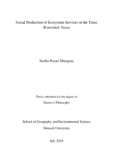Please use this identifier to cite or link to this item:
http://archive.nnl.gov.np:8080/handle/123456789/265| Title: | Social production of ecosystem services in the Tinau watershed, Nepal |
| Authors: | Dhungana, Sindhu Prasad |
| Keywords: | Tinau watershed Ecosystem |
| Issue Date: | 16-Jan-2018 |
| Abstract: | The concept of 'ecosystem services' has drawn considerable attention of people engaged in environmental, forestry and natural resource policy and management. There are two broad perspectives regarding the concept. The first emphasises the advantage of using pricing mechanisms to value the different components of ecosystems that operate in the form of ‘services’ for keeping the environment healthy and functional for people. It argues that by allocating monetary values to these ecosystem services, people who are involved in protecting them can receive proper compensation for their actions by others who derive benefits from such efforts. Payment for ecosystem services is thus viewed as an economically rational, market-based approach that incentivises people to protect the environment in return for monetary profit, which can be used to further invest in enhancing environmental benefits. The second perspective is critical of the concept of ecosystem services, arguing that it is yet another neoliberal strategy aimed at commoditizing and privatizing nature in new ways and creating a market for such services that benefits a few and excludes the majority of people who do not have the financial capacity to pay for them. However, neither of these perspectives considers how the meaning and materiality of ecosystems are produced as socio-natural entities, and how they are imbued with a wide range of values associated with people's livelihoods, traditions and cultural practices. This alternative perspective provides a more grounded and nuanced understanding of how these diverse values can be used to understand and manage ecosystems in ways that improve and strengthen their meaningfulness for the communities and groups involved. This thesis aims to analyse how the material and meaning of ecosystem services are socially produced in the context of the Tinau watershed in Western Nepal. This watershed encompasses the Siwalik Hills of the outer Himalayas and the sub-Himalayan lowlands known as the Terai. The watershed has been targeted by the government and international agencies for piloting a ‘Payment for Ecosystem Services’ project, where communities living in the hill areas are to be compensated by downstream communities for their efforts in protecting and increasing forests in the watershed. By adopting Henri Lefebvre's framework of 'the production of space', the thesis examines how the relationship between the highlands and lowlands has been established over time, and how this relationship shapes the Tinau watershed and ecosystems in terms of the interaction of spatial processes and their socio-natural outcomes. Lefebvre’s framework holds that space is a dynamic and living entity produced from the interaction of three interrelated components: spatial practice, representations of space, and representational spaces. I examine these three components of production by drawing on theoretical work on commons and common property, epistemic communities, and political ecology. The thesis traces the political-economic and attendant social and ecological changes in the Siwalik and the Terai through different historical phases of Nepal’s emergence and identity as a Himalayan nation state to provide the context for the Tinau watershed case study. The historical review shows the development of a conceptual and material division between the hills and the plains in terms of unequal access to natural resources, economic benefits and political power that has consistently favoured the political interests of the hill elites. This unequal relationship has been politically reproduced at the regional scale in terms of conceptualising the Siwalik and Terai as two separate physical entities. The thesis shows how these concepts of the Siwalik and Terai have in turn influenced the delineation of theTinau watershed in terms of ‘upstream’ and ‘downstream’ for 'payment for ecosystem services'. The thesis illustrates that the spatial practice at different locations along the Tinau watershed are connected by the multi-directional flows of people and resources through their everyday practices. These spatial practices produce the watershed as a complex set of socio-natural ecosystems interlinking villages and towns in the Siwalik and the Terai. In contrast, political authorities and dominant players such as the government agencies and international NGOs represented the Tinau watershed entirely within the Siwalik area and defined it as the ‘upstream’ source of ecosystem services that provided benefits to the ‘downstream’ Terai area. The thesis then explores the concerns and values of people living in the Siwalik and Terai areas of the Tinau watershed to examine their interpretations of the watershed, forest ecosystems, and management of watershed resources. It shows that the representational space emerging from their concerns and values interprets the Tinau watershed as a commons space with a shared sense of belonging and the need for collective action for its management. The thesis concludes by reflecting on these findings from the Tinau watershed, arguing that they provide radical ways of thinking about valuing ecosystems and managing them without relying on the concept of ‘payment for services’. It shows how the study offers alternative ways of overcoming the conceptual and politicised divisions between mountain and plains that have persisted in policy and state-making in Nepal, and argues that these alternatives can produce a sustainable common future for the nation’s Terai and Himalayan regions. |
| Description: | Thesis submitted for the degree of Doctor of Philosophy, School of Geography and Environmental Science, Monash University, 2014. |
| URI: | http://103.69.125.248:8080/xmlui/handle/123456789/265 |
| Appears in Collections: | 500 Natural sciences and mathematics |
Files in This Item:
| File | Description | Size | Format | |
|---|---|---|---|---|
| eThesis_Sindhu Prasad Dhungana.pdf | 3.21 MB | Adobe PDF |  View/Open |
Items in DSpace are protected by copyright, with all rights reserved, unless otherwise indicated.